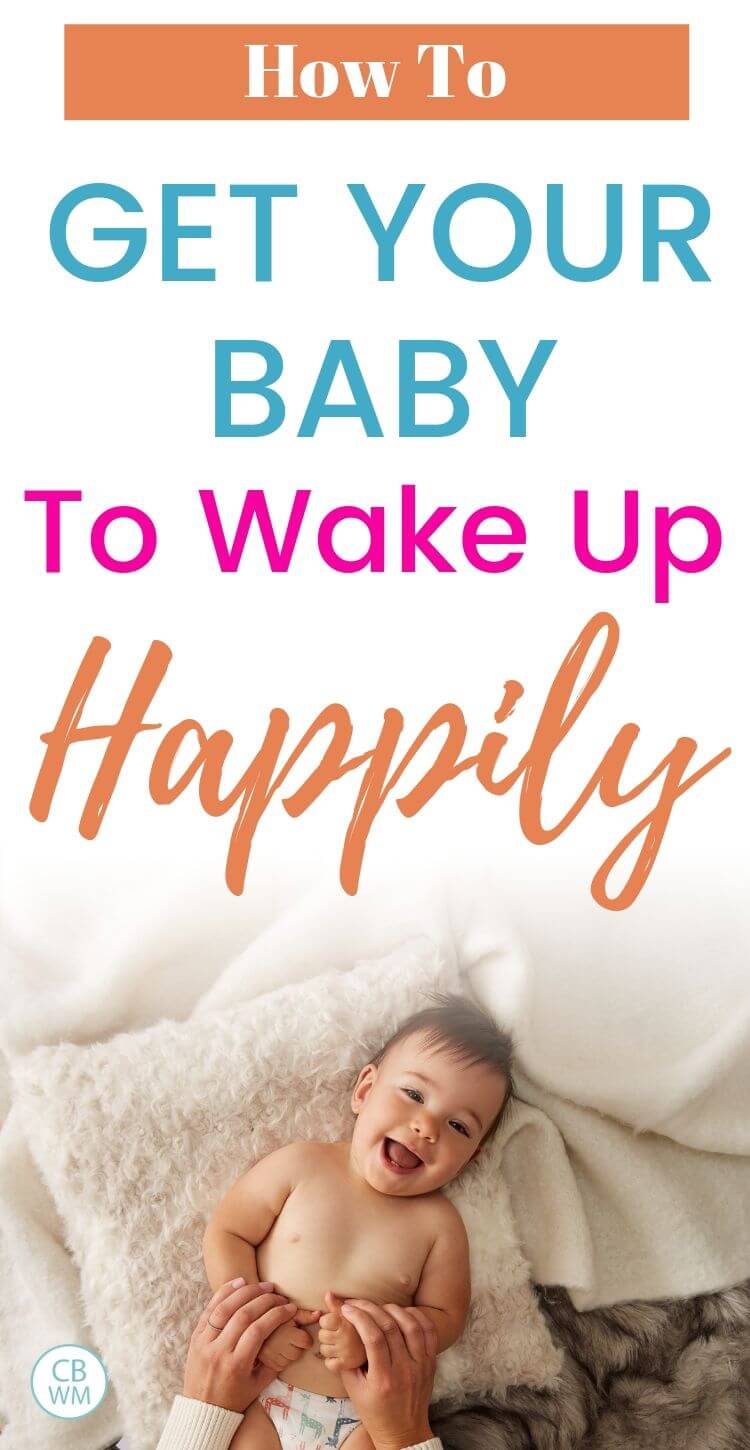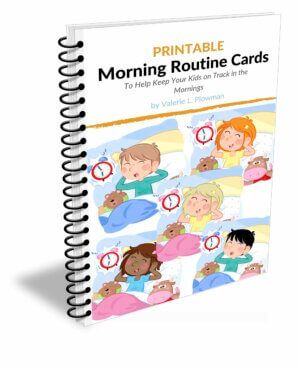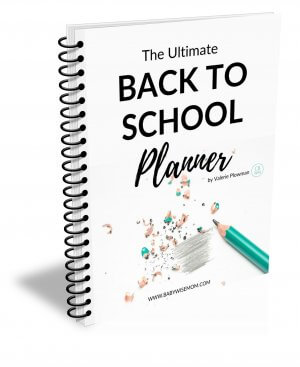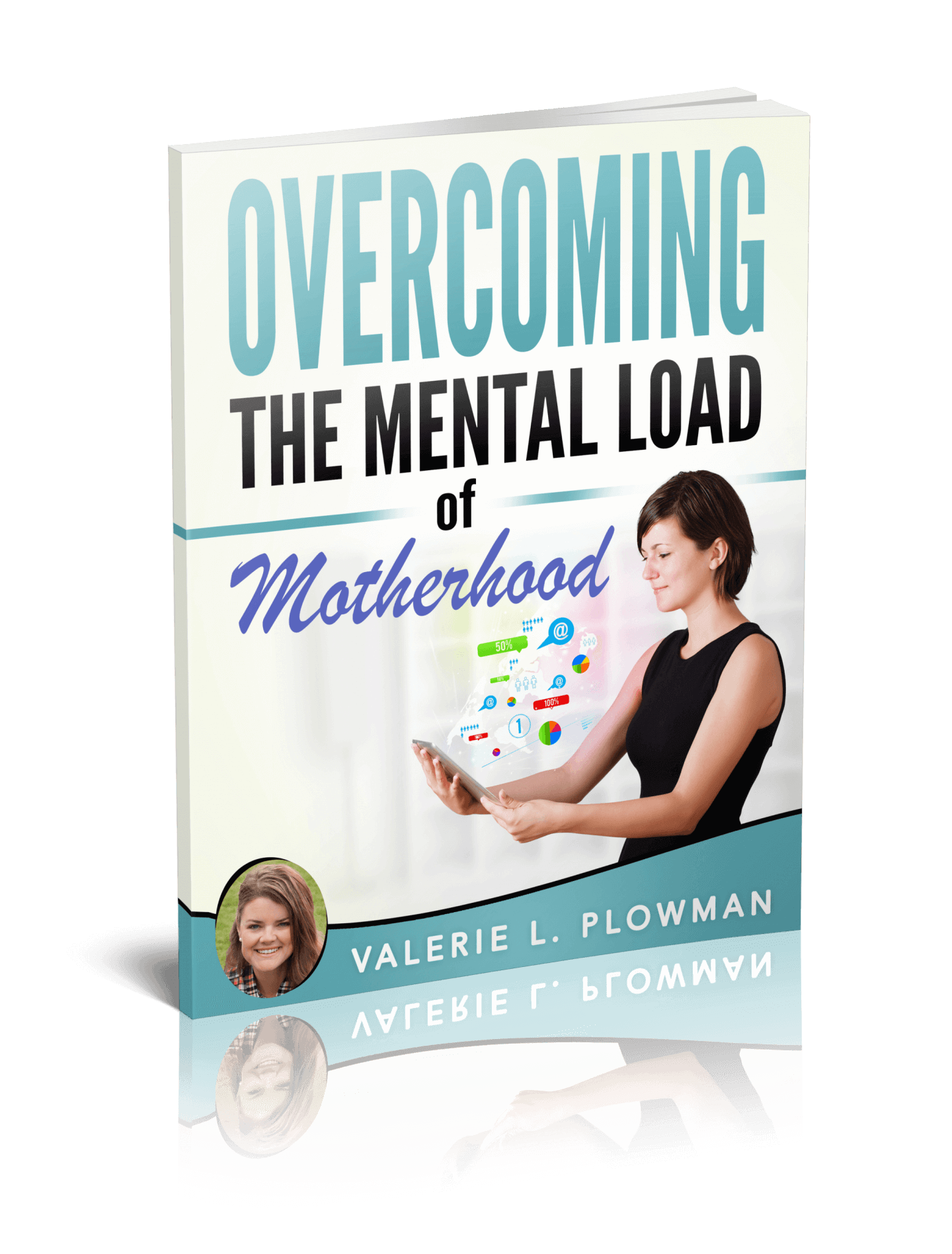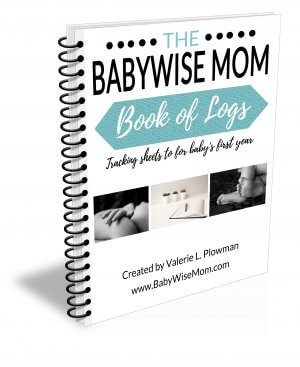Your baby CAN wake up happily. In fact, waking up happy is a good sign baby is getting her sleep needs met. Read this for tips on how to achieve this.
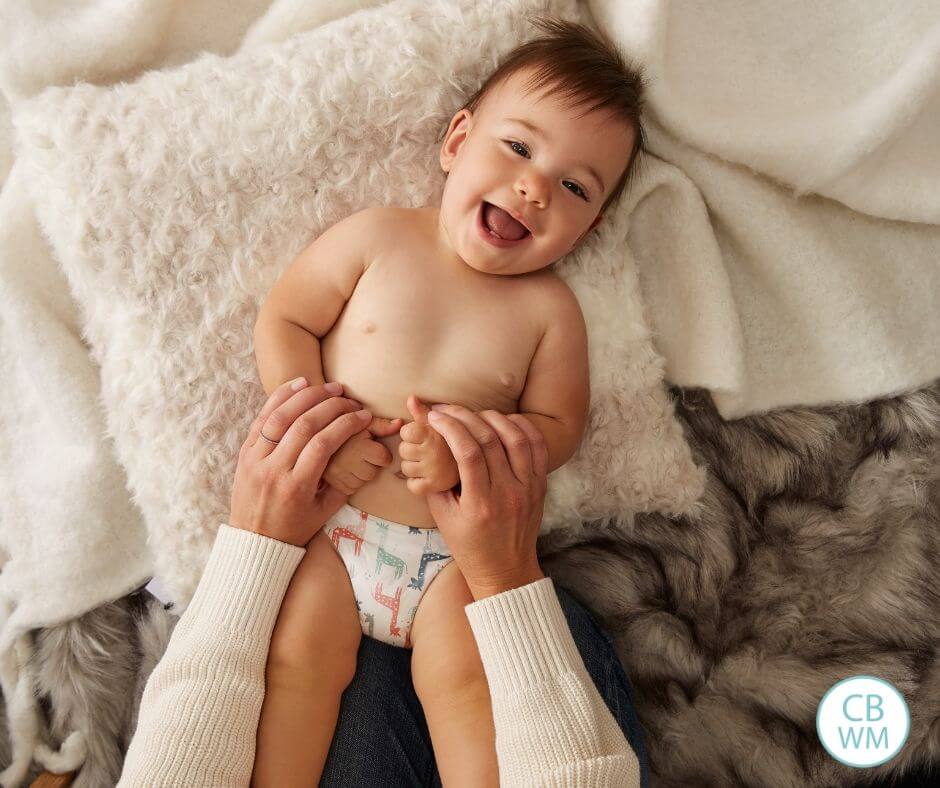
Did you know a baby can wake up from a nap and wait happily in her crib until you come get her? Does that sound far-fetched? It isn’t!
All four of my children got to the point that they woke up from a nap and happily babbled to themselves until I got them up. There are simple tips to follow to make this happen.
Post Contents
- What Age Can Baby Wake Up Happy From Naps
- Rules to Follow To Get Baby To Wake Up Happy
- Mom, Not Baby, Decides
- RULE #1: Mom, not baby, decides when nap will start
- RULE #2: Mom, not baby, decides when nap will end
- Establish Solid Sleep
- Thank you!
- RULE #3: If baby wakes up cranky, he didn’t have a good enough nap
- Conclusion
What Age Can Baby Wake Up Happy From Naps
On Becoming Babywise says that your child should start to wake up happy around 4-6 months (see pages 133 and 134). That is the time the wake-up disposition is usually developed. Up until that point, you will probably have the stereotypical baby waking up crying.
If your child is older than 6 months old and regularly wakes up from a nap crying, then I would look into the situation to see how to change that. Your little one might be teething or need an adjustment to the schedule somehow. I have this post to help troubleshoot common reasons for poor sleep in 5-8 month olds. You can find a more general list of reasons for poor sleep for any age here.
Rules to Follow To Get Baby To Wake Up Happy
There are a few rules to follow to ensure that your baby will wake up happy once he is old enough. Follow these rules from birth or from the time you learn of them.
- Mom, not baby, decides when nap will start
- Mom, not baby, decides when nap will end
- If baby wakes up cranky, he didn’t have a good enough nap
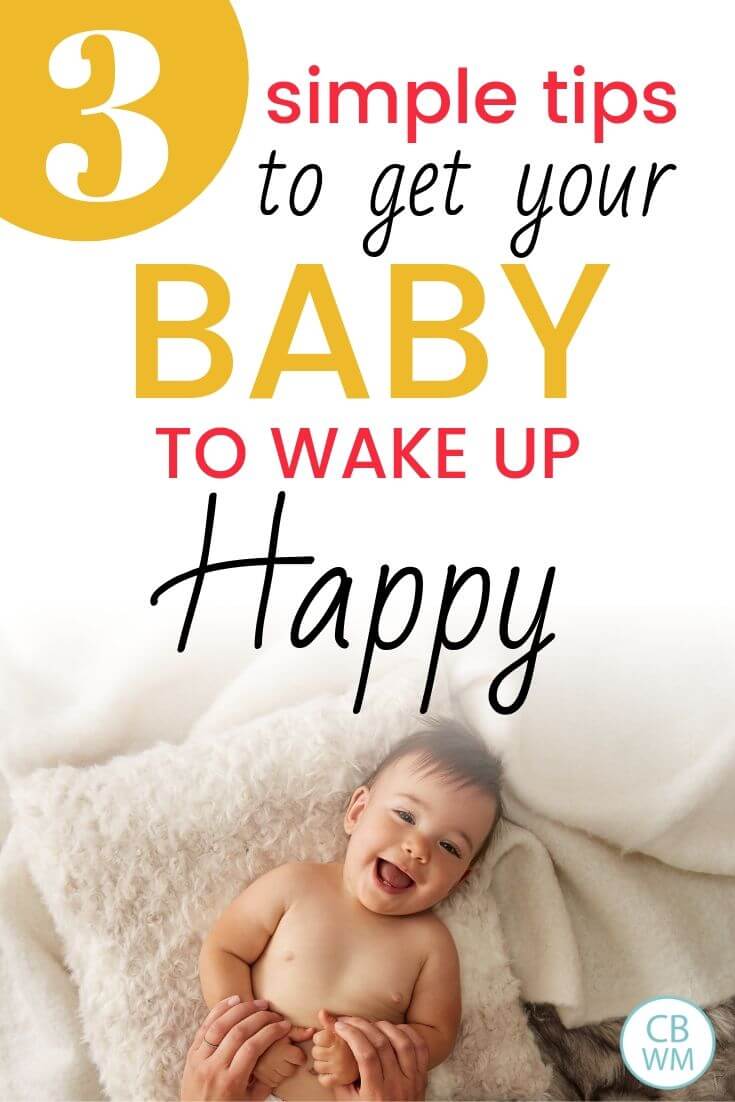
Mom, Not Baby, Decides
Before you read any further, be sure you understand the concept of “Mom, not baby, decides…”. Read more about that concept here.
Once you understand the concept of “Mom, not baby, decides…” it should be more clear as to why that is so vital for your baby’s wake up disposition.
This doesn’t mean you say, “I know you aren’t tired right now, but you are going to bed because I decided.” It means that you analyze the factors to ensure your child is getting enough sleep. You say, “Hmm…you aren’t tired right now even though you usually are. Maybe you are ready to extend waketime length?”
In order to “decide” as accurately as possible, you need some tools and abilities. You need to know your child. I have written a post with tips to get to know your child’s personality.
Keeping track of things is a super effective way to quickly get to know your child’s personality and needs. I have a fantastic Book of Logs PDF you can purchase to help you track all of the details you need. Click below to read more:
When you know your child, you know the sleep cues. You can see a list of common sleep cues in this post so you know what to watch for.
Not all babies show sleep cues. Some show sleep cues while younger and then stop. Paying attention and knowing your baby helps you know that so you can watch the clock.
As the parent, you also know your child’s sleep needs. Does he sleep more than average? Less than average? Adjust expectations and goals according to your child’s sleep needs.
You also know how he feels about sleep. My oldest and youngest both didn’t particularly like to sleep. My two middle girls loved it, though.
With my babies who loved sleep, if they cried after I put them down, I know something is really wrong.
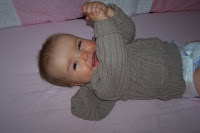
When you know your child, you know how disruptions affect him. You know how extra stimulation affects him. You know whether it is no big deal or if he needs to go down a bit early after being at a big family party.
You also need to know your child’s sleep patterns. Having a consistent schedule makes this job much easier. Read my post on Getting a Consistent Schedule if you need help with consistency and predictability. If you have a hard time hitting things right, keep a log! Write everything down.
You also need to know how long the nap should last. Then, if the nap is shorter than it should be, you can do problem solving to decide why and what to do about it. There is variance depending on the baby’s age and which nap of the day it is, but in general, you are aiming for a 1.5-2.5 hour long nap. Later naps in the day are often only 45 minutes long.
And if you want some great help with naps, get my eBook Nap Guide.
Let’s go over each rule with a bit more detail:
RULE #1: Mom, not baby, decides when nap will start
Like I said, this doesn’t mean you put your child down when you feel like it and insist he sleep. This means you consider all factors to know when you should put him down.
- Sleep cues are a wonderful way to know when the nap needs to start. Find sleep cues here and also here.
- Optimal waketime length will help you partner with the clock to guide the length of time until the next nap. This is knowing the perfect length of waketime for your child so she will take the right length of nap and not get overtired. Read all about when and how to extend waketime length here. A log will also help you determine how long this should be.
- Actual waketime length is another good indicator. Knowing when your child woke up from the nap helps you monitor the waketime. If your child wakes up and is pretty quiet, a baby monitor helps to hear those first babbles. I definitely needed one for Kaitlyn.
- Waketime activities are important to some children. If you were at a noisy place, your child might be overstimulated and need to go down earlier. This is another area where keeping a log helps. Read more in How to Calm Your Overstimulated Baby.
- Desired naptime length coupled with the next one,
- Cycle length will help you gauge the waketime length. If you are on a 3 hour schedule and want a 1.5-2 hour nap, then you need 1-1.5 hours of waketime.
These things will all help you decide when the nap should start. When you get this right, baby will [usually] fall asleep quickly and then sleep the correct length of time. Keep in mind that 1.5 hours of sleep is good enough for many babies.
You decide when it starts. If your child protests (which many do; they want to play not sleep), you still decide. You don’t say, “Oh, well I know you really should go down right now, but since you don’t want to, you can stay up an extra 15 minutes and see if you change your mind by then.” At that point, your child will likely be too tired and take a short nap–and therefore wake up early.
At those stages when baby is working on skills or talking and playing instead of going to sleep, you need to address that. Be sure your child is getting enough practice on the skills for waketime. Know if you should interfere or not. Maybe you need to go in and tell him it is time to lay down and go to sleep. Read more about this in How To Stop New Skills from Disrupting Naps and Sleep
RULE #2: Mom, not baby, decides when nap will end
Again, you don’t just say, “I have decided you will sleep for 2.5 hours even though you usually nap for 1.5 hours, so do so.”
No.
You need to consider factors to determine how long your child should be sleeping. Many of them are similar to the previous section.
- Desired naptime length for your cycle length and child’s age will help you gauge the naptime length. If you are on a 3 hour schedule then you want a 1.5-2 hour nap. Again, keep in mind that 1.5 hours is okay. If your child sleeps that long and is happy, don’t fight him to go back to sleep.
- Child’s sleep disposition will tell you which end of the range your child is at. I have had one who was at the shorter end of averages. I have had a couple who were always at the longer end of averages. I have had one pretty average. Know where your child is and what to expect.
- Know when your baby actually wakes up from the nap. A monitor will tell you this. This way you will know for sure if your child woke up happy initially and then started to cry after being awake in his crib for 15 minutes, or if he woke from a sound sleep in a cry. I have to use a monitor to know this.
- If your child wakes earlier than he should, analyze the external factors and troubleshoot the situation. Is your child teething or sick? Was the dog barking? Is your child in a growth spurt? Was he up too long? Is he cold? Really try to find the reason for the early waking so you can know both what to do about it and how to avoid it in the future. See Naps: Troubleshooting and The First 5 Things to Check When Your Baby is Taking Short Naps.
- Be aware of transition time. 30-45 minutes into a nap is the transition time, and your child can be woken up more easily at this time. If the dog was barking during the transition and your child woke up, that is likely the reason. With Brayden, we were always quiet at his transition time. He was so curious that if he heard one sound, he woke fully. Kaitlyn liked to sleep and didn’t seem to care what was going on while she is sleeping (interestingly, we have her in the noisiest bedroom in the house even today because she will sleep through anything). This is another reason I like monitors. You then know the time your child actually fell asleep–or at least have a better idea.
- Wake baby up if necessary. If your child is a sleeper and still asleep when the nap should be over, wake him up. This is part of your decision. Of course, there are times you will decide it is better for him to sleep a little longer. Maybe his previous nap was too short. Maybe he is sick and needs some extra sleep. It is correct to wake up a sleeping baby if needed!
A huge part of nap succcess day after day is starting each morning off consistently. This is also a time you need to decide to wake your baby up. If your baby is waking early in the morning, read this post.
RULE #3: If baby wakes up cranky, he didn’t have a good enough nap
If your baby is well-rested, he will wake up and be happy initially (older than 6 months old). He will wake up and babble or sing or whatever. Some will do that for a long time before you go get him. Others are less patient and will soon start to scream for you.
If your child is waking up early, you then need to decide what to do about it. See these posts for help in that decision:
- What to Do When Baby Wakes Early From Naps or Won’t Fall Asleep For Naps
- Easy Nap Fix
- Everything You Need to Know About Dropping Naps
- Waketime When Baby Wakes Early
- Comforting a Sick Toddler/Baby and Maintaining the Schedule
- Dealing With Disruptions To Your Routine
- How To Stop New Skills from Disrupting Naps and Sleep
Conclusion
Hopefully through this post and “Mom, not baby, decides…” you can see how so many things for successful sleep are intrinsically connected. So many things are linked and a domino effect quickly happens, for better or worse.
Following these three rules can help you to help your baby wake up from nap or in the morning happily. This is a great sign that your baby is getting the sleep he needs and that everything is optimal.
